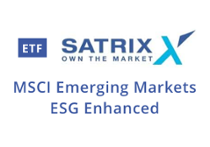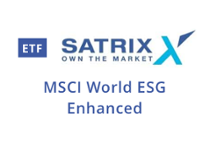What is ESG Investing?
ESG investing is a socially responsible form of investing that does not only look at investment returns but also prioritises a company’s impact on the environment, its stakeholders, and the planet. A single phrase that describes the ESG investing is: “doing well by doing good.”
The actual performance of ESG stocks has recently drawn a lot of investor attention. During the market turbulence related to the COVID-19 pandemic, for example, companies with strong ESG track records showed lower volatility than their non-ESG counterparts.
To many investors, that performance proved the value of ESG investing and that good corporate behaviour means better long-term performance or that over time, better behaviour means more money. Antidotally, it does make sense that at some point in the future social good and financial interests align - there are no investment returns at all on a planet left uninhabitable.
ESG funds and shares provide investors with an opportunity to own a portfolio that aligns with their values.
What does ESG stand for?
"ESG" stands for environmental, social, and governance
E is for environmental
%20(2).png?width=1200&name=ESG%20(1200%20x%20300%20px)%20(2).png)
The environmental component talks to the conservation and protection of the natural environment through:
- Air emissions and air quality.
- Energy use and conservation.
- Natural resources and land use.
- Waste management and water quality.
- Hazardous materials use.
S is for social
%20(1).png?width=1200&name=ESG%20(1200%20x%20300%20px)%20(1).png)
The social component talks to the company’s relationships with employees, suppliers, clients, and communities including:
- Labour standards and employee relations.
- Production quality and safety.
- Local community impact.
- Equal employment opportunities.
- Provision of health care, education, and housing.
G is for governance
.png?width=1200&name=ESG%20(1200%20x%20300%20px).png)
The governance component relates to board independence, leadership, risk controls, shareholder rights and business ethics.
- Ethical business practices.
- Board independence and diversity.
- Voting rights.
- Executive pay and whether they’re tied to long-term business value.
- Account and tax transparency.
- Relationship with regulatory bodies.
How Does ESG Investing Work?
ESG investors invest in companies that score highly on environmental and societal responsibility indicators. You can evaluate a company’s ESG performance by interrogating the company’s sustainability reports or through information provided by third-party independent companies, and research groups.
Companies committed to ESG publish their goals and progress towards those goals in their sustainability reports. Definitely look for reporting that follows ESG standards established by the Global Reporting Initiative or the United Nations for example as not all reports are equal.
You can also use third-party sources to validate sustainability reports - several companies and research groups produce ESG ratings or scores which can be used to compare different investment options in a similar way to how investors use credit ratings. You can invest directly in companies with high ESG ratings by purchasing shares in those companies and divesting from companies with low ESG scores. There are also a range of structured ESG investment products available to investors like specialised ESG funds.

The Benefits of ESG Investing 🎁
The underlying argument for ESG investing is that there are certain environmental, social and governance factors that impact business performance in the long-term. Therefore, appropriately evaluating those factors can gives investors a more complete view of a company, mitigate risk and identify opportunities.
Better Returns 📈
There is growing research, albeit inconclusive at this stage (more about that below), that ESG stocks generate superior financial returns compared with their non-ESG companies. One theory on why ESG companies perform better is that ESG focus requires strong leadership. ESG initiatives are long-term, and a leadership team’s ability to identify and realise long-term goals is a competitive strength.
Reduced Risk 📉
In any company, ESG issues pose risks to the company’s operations and profits. Companies that actively work to address or mitigate these risks should see fewer disruptions and produce more stable financial results over time, with lower downside risk for investors.
Increases Cost of Doing Bad 📊
ESG investing will in time raises the cost of capital for low ESG companies, which means they will have less and less access to financing.

The Argument Against ESG Investing
- Of course, not everyone agrees, below are some of the main arguments against the premise of ESG investing:
- One of the most compelling arguments is that ESG investing deflects away from potentially more effective solutions to these grand problems e.g., regulatory actions like implementing carbon taxes may be more effective than actions of individual companies in addressing climate change.
- Linked to the above is the fact that the problems are typically very long-term in nature and often mismatched to an investor or even a company’s planning horizon.
- One of the goals of ESG investing is to influence people away from certain types of companies. This however could have an effect of making these stocks cheaper and potentially setting them up to outperform.
Ensuring that your investment choices are aligned with your personal priorities and values is a valid reason to pursue ESG investing. It makes sense to want to ensure that you don’t invest in companies that exacerbate or contribute to problems you care about, especially when you can invest in those that are champions in tackling those challenges instead.
%20(2).png?width=1200&name=ESG%20(1200%20x%20300%20px)%20(2).png)
%20(1).png?width=1200&name=ESG%20(1200%20x%20300%20px)%20(1).png)
.png?width=1200&name=ESG%20(1200%20x%20300%20px).png)

